
Smart Cities
Scope & Guideline
Transforming Urban Futures Through Innovation
Introduction
Aims and Scopes
- Urban Technology Integration:
Focuses on the adoption and implementation of smart technologies such as IoT, AI, and data analytics to improve urban infrastructure and services. - Sustainable Urban Development:
Explores strategies for achieving sustainability in urban environments, including energy management, waste reduction, and carbon neutrality. - Community Engagement and Social Inclusion:
Investigates the role of citizen participation in smart city initiatives, ensuring that the development process is inclusive and addresses the needs of diverse populations. - Transportation and Mobility Solutions:
Covers advancements in urban mobility, including smart transportation systems, shared mobility, and the integration of electric vehicles. - Resilience and Risk Management:
Examines approaches to enhancing urban resilience against climate change, natural disasters, and other risks through innovative planning and infrastructure. - Governance and Policy Frameworks:
Analyzes the governance structures and policy frameworks necessary for the successful implementation of smart city projects, including e-governance and public-private partnerships.
Trending and Emerging
- Artificial Intelligence and Machine Learning Applications:
Research on AI and machine learning is rapidly increasing, focusing on their applications in urban management, predictive analytics, and decision-making processes. - Sustainable Energy Solutions:
There is a growing emphasis on renewable energy integration, energy efficiency, and smart grid technologies as cities strive for sustainability and resilience. - Blockchain for Urban Services:
The application of blockchain technology is gaining traction, particularly in areas such as data security, smart contracts, and decentralized governance. - Health and Well-Being in Urban Environments:
Studies addressing the intersection of urban design, public health, and well-being are emerging, particularly in the context of post-pandemic recovery. - Data Privacy and Cybersecurity:
With the rise of smart technologies, there is an increasing focus on the implications of data privacy and cybersecurity in smart city initiatives. - Nature-Based Solutions for Urban Challenges:
Research is trending towards incorporating nature-based solutions to enhance urban resilience and sustainability, emphasizing green spaces and ecosystem services.
Declining or Waning
- Traditional Urban Planning Approaches:
There is a noticeable decrease in publications focused on conventional urban planning methodologies as the field increasingly embraces technology-driven solutions. - Static Infrastructure Models:
Research centered on fixed infrastructure models is diminishing as the focus shifts toward dynamic, adaptive systems that respond to real-time data and user needs. - Basic Data Collection Techniques:
Papers that discuss rudimentary data collection methods are less frequent, indicating a shift towards sophisticated, integrated data analytics and machine learning techniques. - Generalized Studies on Smart Cities:
Broad, non-specific studies on smart cities are declining in favor of more targeted research that addresses specific challenges or technologies within smart city frameworks. - Single-Disciplinary Research:
There is a waning interest in studies that do not incorporate interdisciplinary perspectives, as the complexity of urban challenges demands collaborative approaches.
Similar Journals
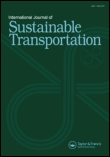
International Journal of Sustainable Transportation
Transforming Transportation through Research and InsightInternational Journal of Sustainable Transportation, published by Taylor & Francis Inc, stands at the forefront of research in sustainable mobility, addressing critical challenges within the fields of engineering, environmental science, and urban planning. With ISSN 1556-8318 and E-ISSN 1556-8334, this journal is recognized for its exceptional quality, evidenced by its Q1 rankings across multiple categories including Automotive Engineering, Civil and Structural Engineering, Environmental Engineering, and Transportation, as well as a notable presence in Renewable Energy and Sustainability. Its impact is further amplified by impressive Scopus rankings, securing top positions in various fields, ensuring that it serves as a pivotal resource for researchers, practitioners, and policymakers dedicated to advancing sustainable transportation solutions. The journal actively disseminates cutting-edge research that informs sustainable practices worldwide, thus contributing to the development of greener transportation methods. As it continues its mission from 2007 to 2024, International Journal of Sustainable Transportation remains essential for anyone looking to explore innovative approaches to the transportation challenges of our time.
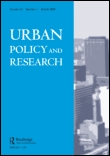
Urban Policy and Research
Enhancing Understanding of Urban Dynamics and DevelopmentUrban Policy and Research is a leading academic journal dedicated to advancing the fields of urban studies and geography, planning, and development. Published by Routledge Journals, Taylor & Francis Ltd, the journal has been a vital resource since its inception in 1982 and continues to shape scholarly discourse up to 2024. With an impressive 2023 Scopus ranking that places it in the 70th percentile for Urban Studies and 63rd percentile for Geography, Planning and Development, it reflects a strong commitment to rigorous research and innovative insights. Although not an open-access journal, it provides valuable access options to support the dissemination of knowledge among researchers, professionals, and students. By engaging with a diverse range of topics, Urban Policy and Research serves as an essential platform for exploring contemporary urban challenges and fostering informed policymaking in an evolving global landscape.
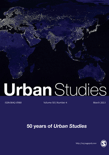
URBAN STUDIES
Transforming Urban Studies Through Critical Analysis and EngagementURBAN STUDIES, published by SAGE Publications Ltd, stands as a premier journal in the field of urban studies and environmental science, evidenced by its prestigious Q1 ranking in both categories for 2023. With an ISSN of 0042-0980 and an E-ISSN of 1360-063X, this UK-based journal has been disseminating pivotal research since its inception in 1964, and will continue to do so until 2024. As a leader in the social sciences, it ranks #11 out of 279 in the field of Urban Studies and #15 out of 219 in Environmental Science, achieving remarkable percentiles of 96% and 93% respectively. Although not an open-access journal, URBAN STUDIES provides a platform where scholars, practitioners, and students can engage with cutting-edge research, critical analyses, and innovative solutions addressing the complexities of urban environments. By publishing studies that encompass economic, social, and environmental dimensions of urbanization, the journal contributes significantly to the discourse on sustainable development and urban planning.
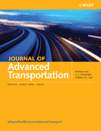
JOURNAL OF ADVANCED TRANSPORTATION
Empowering Global Collaboration in Transportation StudiesJOURNAL OF ADVANCED TRANSPORTATION, published by WILEY-HINDAWI, stands as a pivotal platform in the fields of automotive engineering, computer science applications, economics, mechanical engineering, and strategy and management. With an impressive impact factor and positioned in the Q2 quartile across multiple categories as of 2023, this open-access journal offers researchers, professionals, and students unparalleled opportunities to disseminate and access cutting-edge research. Operating under an open access model since 2017, the journal fosters global collaboration and knowledge exchange, encouraging innovative solutions to contemporary transportation challenges. Its comprehensive scope, spanning converged years from 1979 to 2024, reflects its commitment to addressing the evolving landscape of transport systems worldwide. Researchers from diverse disciplines are invited to contribute transformative studies that advance the field and inspire future endeavors.

Computational Urban Science
Navigating Urban Challenges with Data-Driven StrategiesComputational Urban Science is a pioneering open-access journal published by SpringerNature, dedicated to the interdisciplinary exploration of urban systems through computational research and innovative technologies. Launched in 2021, the journal is committed to advancing understanding in fields such as Artificial Intelligence, Computer Science Applications, and Environmental Science, alongside its significant focus on Urban Studies—a category where it has attained a distinguished Q1 ranking. With a robust impact reflected in its Scopus rankings, including a 78th percentile in Urban Studies, Computational Urban Science serves as a vital platform for researchers and professionals seeking to address contemporary urban challenges with data-driven insights. This journal not only champions comprehensive discussions and research findings but also invites contributions that emphasize the role of computational methodologies in shaping sustainable urban environments. Embrace the opportunity to engage with transformative research and join a growing community dedicated to the future of urban science.
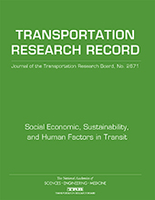
TRANSPORTATION RESEARCH RECORD
Navigating the Path of Transportation InnovationTRANSPORTATION RESEARCH RECORD is a premier journal published by SAGE PUBLICATIONS INC, focusing on the latest advancements and research in the fields of civil and structural engineering as well as mechanical engineering. Since its inception in 1974, this journal has become an essential platform for disseminating innovative methodologies, case studies, and comprehensive reviews that address critical issues in transportation systems and infrastructure. With a respectable Q2 ranking in both engineering categories as of 2023, it solidifies its position among reputable publications, catering to a diverse range of scholars, professionals, and students. The journal not only facilitates access to high-quality research but also plays a pivotal role in shaping policy and practice through its robust findings. For those invested in the engineering disciplines, particularly within the transportation domain, TRANSPORTATION RESEARCH RECORD is an invaluable resource, with a wide array of topics covered throughout converged years, from 1974 to 1990, and from 1993 to 2024, ensuring a comprehensive exploration of historical and contemporary challenges in transportation.
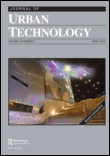
JOURNAL OF URBAN TECHNOLOGY
Innovating Solutions for Smart CitiesJOURNAL OF URBAN TECHNOLOGY is a premier academic journal published by Routledge Journals, Taylor & Francis Ltd, focusing on the intersection of technology and urban studies. With a strong commitment to advancing knowledge in urban environments, this journal has achieved impressive rankings, being classified in the top Q1 quartile for Urban Studies and holding a position of #16 out of 279 in its category according to Scopus. It serves as a vital platform for researchers, professionals, and students interested in exploring innovative solutions and theoretical considerations in urban technology, offering a comprehensive range of articles that cover both empirical and conceptual works. While the journal is not open access, it provides exceptional insights and fosters interdisciplinary dialogue, making it an essential resource for anyone engaged in shaping the future of urban spaces. Established in 1992 and continuing to significantly influence the field, the JOURNAL OF URBAN TECHNOLOGY stands out as a key publication for those committed to exploring the complexities of urban life in the digital age.
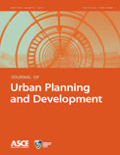
JOURNAL OF URBAN PLANNING AND DEVELOPMENT
Exploring the Intersection of Planning and Progress.The JOURNAL OF URBAN PLANNING AND DEVELOPMENT, published by the ASCE-AMER SOC CIVIL ENGINEERS, stands as a pivotal platform in the realms of urban studies, civil and structural engineering, and development. With an ISSN of 0733-9488 and E-ISSN of 1943-5444, this journal aims to disseminate high-quality research addressing critical urban planning challenges, fostering innovative solutions, and contributing to sustainable development practices. Spanning from its inception in 1979 to the anticipated issues up to 2024, the journal proudly occupies the Q2 category across multiple disciplines, including Civil and Structural Engineering, Development, Geography, Planning and Development, and Urban Studies. Its noteworthy Scopus rankings reflect its influence, notably being positioned in the 76th percentile in Urban Studies. With no open access options currently available, the journal remains a selective forum for scholarly discourse, attracting researchers, professionals, and students eager to engage with cutting-edge developments in urban planning and design.

International Journal of Tourism Cities
Unveiling the Dynamics of Cities and TourismThe International Journal of Tourism Cities, published by Emerald Group Publishing Ltd, is a premier scholarly platform dedicated to advancing knowledge within the fields of tourism and urban studies. With an ISSN of 2056-5607 and an E-ISSN of 2056-5615, this journal boasts a significant impact in its category, firmly positioned in the Q1 quartile for Geography, Planning and Development (2023), and Q2 for both Management, Monitoring, Policy and Law, and Tourism, Leisure and Hospitality Management. Researchers, practitioners, and students engaged in these dynamic sectors will benefit from high-quality, peer-reviewed articles that explore the intersection of tourism and urbanization, offering insights into sustainable development, policy implications, and innovative management strategies. Operating under rigorous academic standards, the journal has made substantial inroads in Scopus rankings, attesting to its influence (ranked 120th in Geography and Planning, 102nd in Environmental Science, and 47th in Tourism Management). Although it does not currently offer open access, its commitment to enhancing the academic discourse surrounding tourism cities ensures that readers are equipped with the most relevant and impactful research from 2015 to 2024.

Frontiers in Sustainable Cities
Empowering Communities with Cutting-edge Urban ResearchFrontiers in Sustainable Cities, published by FRONTIERS MEDIA SA, is an esteemed academic journal dedicated to advancing the fields of Urban Studies, Renewable Energy, and Public Administration. With a commitment to open access since 2019, the journal facilitates the dissemination of high-quality research aimed at creating sustainable urban environments. Operating from Lausanne, Switzerland, this influential publication supports knowledge exchange among researchers, professionals, and students involved in the complex dynamics of urban sustainability. The journal has achieved notable recognition, reflected in its quartile rankings—Q1 in Urban Studies and Q2 in both Public Administration and Renewable Energy, Sustainability and the Environment—indicating its relevance and impact within the scholarly community. Researchers benefit from a broad reach through its open access policy, enhancing visibility and accessibility of important findings that contribute to the development of sustainable cities globally.